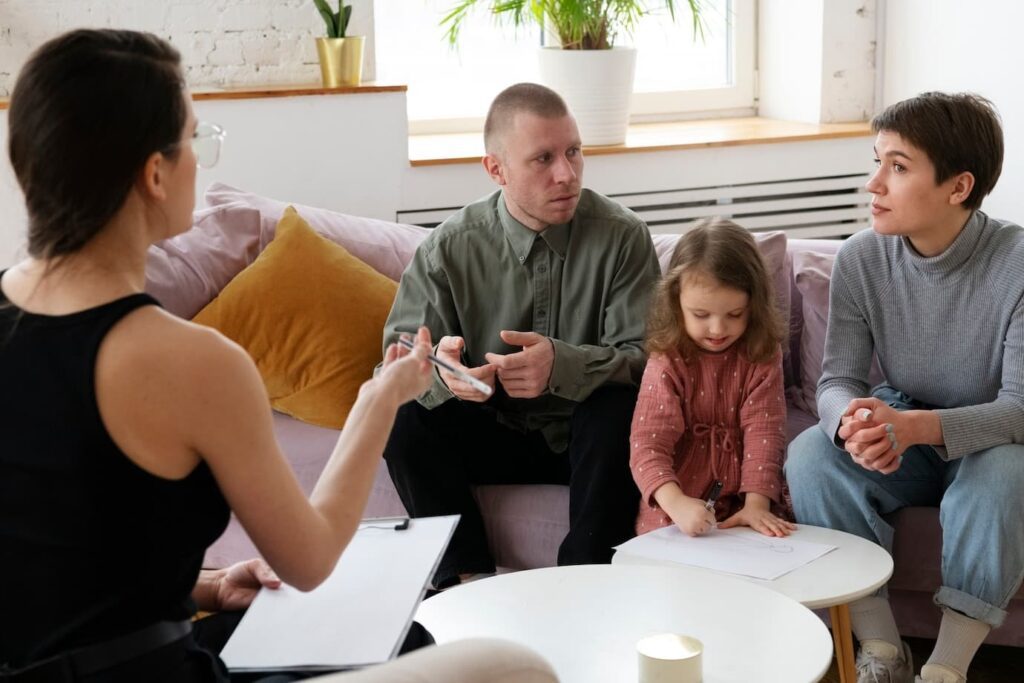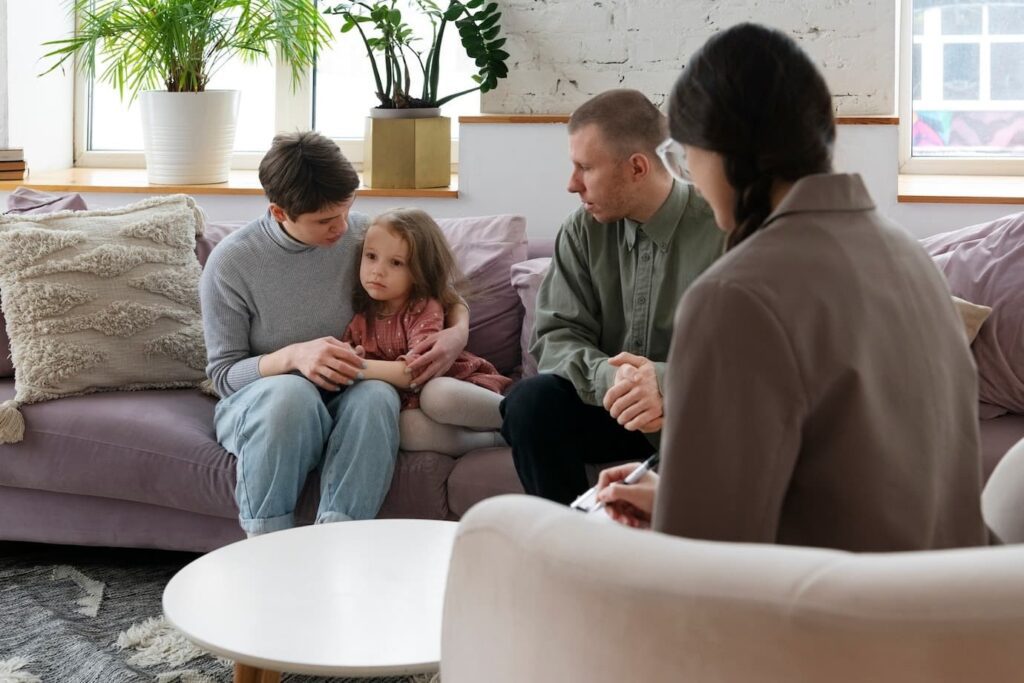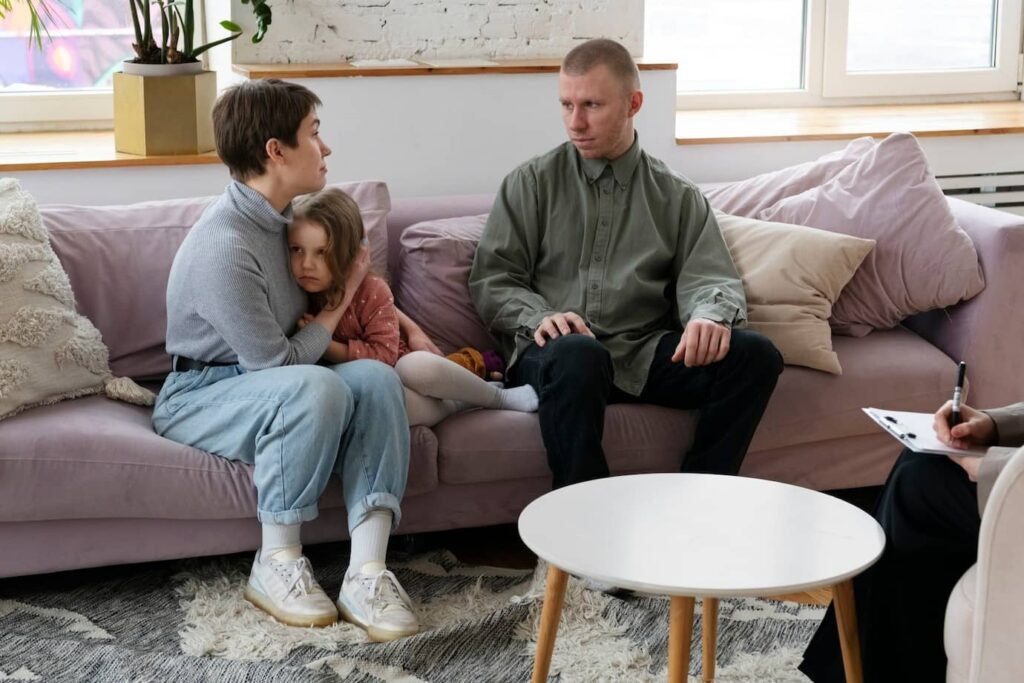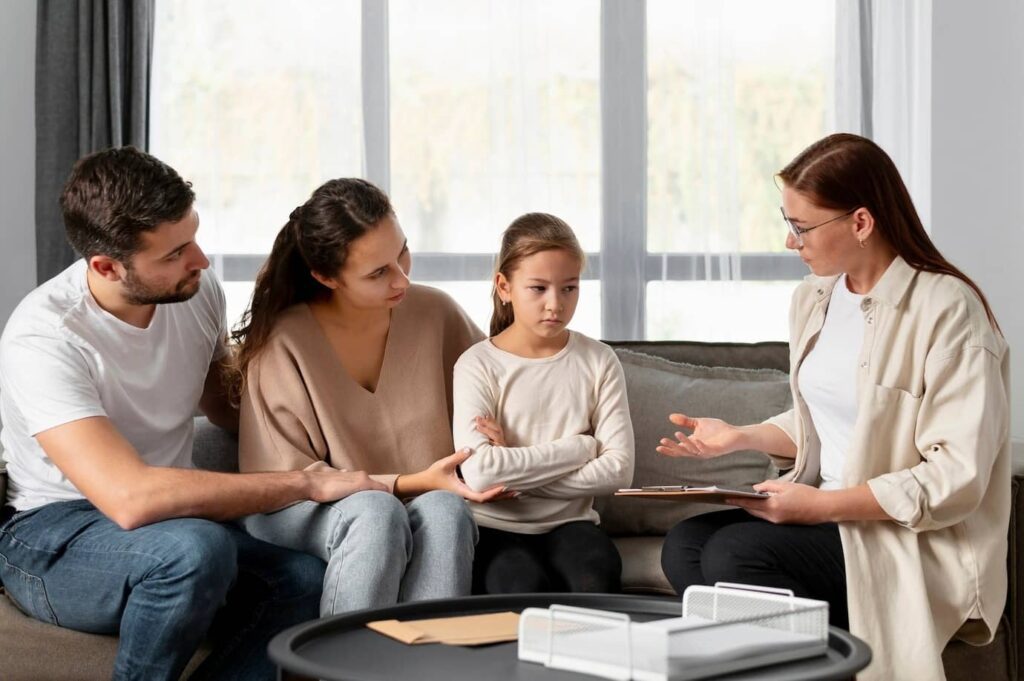Top Psychologists Near Me for Family Therapy
Family Therapy: Building Stronger Connections and Resolving Conflicts
Family life can be both rewarding and challenging. Every family experiences ups and downs, whether it’s due to miscommunication, life changes, or emotional struggles. When these challenges begin to affect the overall well-being of the family, family therapy can provide the support and guidance needed to overcome them. At Medavas, we offer professional therapy services aimed at helping families improve their relationships, resolve conflicts, and develop healthier patterns of interaction.
Table of Contents
ToggleWhat is Family Therapy?
Family therapy, also known as family counselling, is a specialized form of psychotherapy that focuses on the relationships and interactions between family members. Rather than treating each individual separately, this therapy considers the entire family as an interconnected system. The goal is to understand how individual behaviors, emotions, and communication styles impact the family dynamic and to work on strategies for improving these interactions.
The therapy aims to identify unhealthy patterns within the family, whether it’s communication issues, unresolved emotional tension, or behavioral concerns, and address them collaboratively. By promoting healthier communication and understanding, families can begin to heal and develop stronger, more resilient bonds.

What are the Types of Family Therapy?
There are several approaches to family therapy, each tailored to address specific family dynamics. Here are some of the most common types:
1. Structural Family Therapy
Developed by Salvador Minuchin, this approach focuses on reorganizing how family members interact and on the roles each person plays within the family. It examines issues such as hierarchy, boundaries, and relationship dynamics, with the goal of creating a healthier family structure.
2. Systemic Family Therapy
In systemic therapy, the family is viewed as a unit where every member’s behavior influences others. It focuses on the interactions between family members and aims to identify the patterns contributing to conflict or dysfunction.
3. Cognitive Behavioral Family Therapy (CBT)
CBT in a family context helps address negative thought patterns and behaviors that contribute to issues within the family. This approach is useful in addressing specific mental health concerns, such as anxiety, depression, or behavior disorders, and how these issues affect family relationships.
4. Bowenian Therapy
Developed by Murray Bowen, this approach is particularly useful when one or more family members are unwilling to participate in therapy. It focuses on helping an individual within the family reduce emotional tension, which in turn positively influences the family as a whole.
5. Narrative Therapy
This type of therapy involves family members sharing their experiences and stories, which allows them to reframe their challenges in a positive light. Narrative therapy helps individuals separate themselves from their problems, creating space for collective problem-solving.
6. Solution-Focused Brief Therapy (SFBT)
SFBT focuses on identifying solutions to specific problems rather than delving deeply into the past. This short-term, goal-oriented therapy helps families find and build upon their strengths to solve conflicts more effectively.

What are the Techniques of Family Therapy?
Family therapists use various techniques to help families resolve their challenges and improve their relationships. These techniques are designed to enhance communication, foster understanding, and promote a healthier emotional climate.
1. Communication Training
One of the core elements of family therapy is improving communication. Poor communication can lead to misunderstandings and conflicts. Therapists teach family members how to express themselves clearly, listen actively, and respond with empathy.
2. Role-Playing
In role-playing exercises, family members act out different scenarios or switch roles with each other to gain insight into how their actions and words may affect others. This technique is particularly effective in fostering empathy and understanding.
3. Behavioral Assignments
Behavioral assignments involve tasks or exercises that family members complete outside of therapy sessions. These tasks may include practicing new communication skills or attempting to resolve conflicts using techniques learned in therapy.
4. Genograms (Family Mapping)
A genogram is a visual representation of a family’s structure, which helps therapists and family members see patterns of behavior and relationships over generations. This tool helps identify recurring issues within the family and provides insight into how current challenges may be connected to past experiences.
5. Cognitive Reframing
Reframing involves changing the way a family perceives a situation or problem. By viewing conflicts from a new perspective, family members can approach challenges with a more open and solution-focused mindset.

What Issues Can Family Therapy Help Address?
Family therapy is versatile and can be used to address a variety of issues that may be affecting the family dynamic. Some of the most common issues family therapy can help with include:
1. Marital or Relationship Conflicts
When couples struggle with conflict, it often has a ripple effect on the entire family. Family therapy helps couples resolve these conflicts, improving not only their relationship but the overall harmony within the household.
2. Parenting Challenges
Disagreements over parenting styles, discipline, or household roles can create tension within the family. Therapy helps parents align their approaches, improve their parenting skills, and ensure the emotional well-being of their children.
3. Sibling Rivalry
Conflicts between siblings are a common issue in many families. Family therapy can help siblings better understand each other, resolve their differences, and develop healthier relationships.
4. Blended Families
Blended families, where step-parents and step-siblings are brought together, can face unique challenges as they adjust to their new roles. Family therapy helps these families navigate the complexities of their relationships and build stronger bonds.
5. Divorce or Separation
Divorce can be a challenging experience for everyone involved, especially children. Family therapy provides emotional support for family members as they process the transition and helps them maintain healthy relationships through the change.
6. Grief and Loss
The death of a family member can leave a profound impact on the family. Therapy helps family members cope with their grief together and provides a space to express their emotions and support each other.
7. Mental Health Challenges
Mental health issues such as depression, anxiety, or substance abuse can create strain on family dynamics. Family therapy helps members understand and cope with these challenges together, creating a supportive environment for healing.

What are the Benefits of Family Therapy?
Family therapy offers numerous benefits to families who are struggling with conflict, emotional distance, or communication challenges. Some of the key benefits include:
1. Better Communication
Family therapy teaches essential communication skills, enabling family members to express their emotions clearly, listen to each other, and resolve misunderstandings in a healthy way.
2. Conflict Resolution
Rather than allowing conflicts to escalate, family therapy provides tools for resolving disputes constructively, reducing tension and fostering a more harmonious environment.
3. Stronger Emotional Connections
As family members work through their challenges in therapy, they often develop stronger emotional bonds. This process fosters a deeper sense of trust, empathy, and connection within the family.
4. Coping with Transitions
Whether it’s divorce, relocation, or the death of a loved one, major life transitions can be difficult for families. Family therapy helps family members process these changes and adjust to their new reality together.
5. Support for Mental Health Concerns
For families dealing with mental health issues, family therapy provides a space to address these concerns in a supportive and constructive way, offering tools for better understanding and coping with emotional and behavioral changes.

What are the Risks of Family Therapy?
While family therapy can be incredibly beneficial, it does come with certain risks:
1. Reluctance to Participate
Not all family members may be open to attending therapy, and this resistance can limit the effectiveness of the process. If one or more members are unwilling to engage, it may hinder the family’s progress.
2. Emotional Discomfort
Addressing deep-seated emotions and conflicts can be uncomfortable for some family members. However, confronting these issues is often necessary for healing and growth.
3. Temporary Increase in Conflict
In the short term, addressing unresolved conflicts may lead to increased tension within the family. With the therapist’s guidance, however, this tension can be managed and resolved constructively.
How Effective is Family Therapy?
Family therapy is widely regarded as an effective approach for improving family dynamics. Numerous studies have shown that therapy can lead to significant improvements in communication, emotional understanding, and overall family functioning. The success of therapy often depends on the family’s willingness to engage in the process and the therapist’s ability to tailor the approach to the family’s unique needs.
How Does Family Therapy Work?
Family therapy works by creating a safe, structured space for family members to communicate openly and honestly. The therapist acts as a mediator, facilitating discussions and helping family members express their thoughts and feelings in a constructive way. Therapy sessions typically involve identifying problematic behaviors, exploring emotional triggers, and developing strategies for improving relationships.
How Long Does Family Therapy Take?
The duration of family therapy depends on the complexity of the issues being addressed and the family’s progress. Some families may see improvements after just a few sessions, while others may require ongoing therapy over several months. Generally, family therapy lasts anywhere from 8 to 20 sessions, depending on the family’s specific needs and goals.
When Should You See a Family Therapist?
If your family is struggling with ongoing conflict, emotional distance, or mental health concerns, it may be time to seek help from a family therapist. Some signs that your family could benefit from therapy include:
- Frequent, unresolved arguments
- Difficulty communicating or expressing emotions
- Emotional distance or a lack of connection
- Mental health concerns affecting family dynamics
- Challenges adjusting to major life changes

How to Find a Family Therapist?
Finding a qualified family therapist is crucial to ensuring that your therapy sessions are effective. Here are some steps you can follow to find the right therapist for your family:
1. Do Research
Search for licensed and experienced family therapists through trusted sources. At Medavas, we have a team of qualified professionals who specialize in family therapy and are well-equipped to help families overcome their challenges.
2. Ask for Referrals
You can also ask friends, family, or healthcare professionals for recommendations. However, when looking for someone specific to your needs, Medavas provides the expertise and support you’re looking for.
3. Verify Credentials
Ensure that the therapist you choose is licensed and has experience in family therapy. All therapists at Medavas are highly trained professionals with verified credentials.
4. Schedule a Consultation
Before starting therapy, schedule a consultation to discuss your family’s unique challenges and goals. This meeting will help determine if the therapist is the right fit for your family. With Medavas, you can trust that our therapists are dedicated to providing a personalized approach that meets your family’s needs.

Conclusion
Family therapy offers families a chance to heal, grow, and reconnect. Whether you’re struggling with communication issues, emotional tension, or deeper conflicts, family therapy provides a structured, supportive environment to address these challenges. At Medavas, we are dedicated to helping families overcome their obstacles and build stronger, healthier relationships.
If your family is facing difficulties, don’t wait—reach out to Medavas and take the first step toward healing. Together, we can help your family navigate the road to emotional well-being and unity.
Frequently Asked Questions (FAQs) About Family Therapy
What is family therapy, and how does it work?
Family therapy is a type of psychotherapy aimed at improving the interactions and relationships within a family. It typically involves a licensed therapist working with family members to identify challenges, address conflicts, and promote better communication. Sessions are designed to help the family understand each other better and to develop healthier ways of relating to one another.
How long does family therapy take?
The length of family therapy varies based on the issues being addressed and the family’s needs. Some families may experience significant progress in just a few sessions, while others may require longer-term therapy. Typically, sessions may range from 8 to 20, but the exact number depends on the complexity of the situation.
What types of issues can family therapy help address?
Family therapy can help with various issues, including communication breakdowns, parenting conflicts, marital disputes, mental health challenges like anxiety or depression, grief and loss, addiction, and life transitions such as separation, divorce, or blending families. It can also support families facing external stressors like financial strain or relocation.
Can family therapy address mental health concerns?
Yes, family therapy can play a crucial role in managing and understanding mental health issues within a family context. It allows family members to learn how mental health conditions, such as depression, anxiety, or addiction, affect the entire family and offers tools to cope and support the affected individual. The therapy helps to create a supportive environment for everyone.
Is it necessary for all family members to participate in therapy sessions?
While it is beneficial for all family members to participate, it is not always required for everyone to attend. Therapy can still be effective if only some members are involved. The therapist can work with the participating members to provide strategies and insights that can help improve the overall family dynamic.
What are the advantages of family therapy?
Family therapy can lead to improved communication, better conflict resolution skills, stronger emotional bonds, and enhanced problem-solving abilities. It can help families navigate significant life transitions, manage mental health issues, and create a more cohesive family environment. Ultimately, it fosters better understanding and cooperation among family members.
Are there any potential challenges with family therapy?
Family therapy can sometimes bring up difficult emotions and unresolved conflicts, which may cause discomfort or increased tension in the short term. However, with the therapist’s guidance, these challenges are addressed constructively, leading to growth and positive outcomes over time.
How do I find a family therapist?
To find a family therapist, you can explore services provided by Medavas, where experienced professionals are available to support families in resolving conflicts and improving relationships. It’s essential to verify that the therapist is licensed and has specific experience in working with families.
What should I do if some family members don’t want to attend therapy?
It’s not uncommon for some family members to hesitate about joining therapy sessions. If this happens, those willing to participate can begin therapy, and over time, the benefits may encourage others to join. The therapist can still offer useful strategies and support, even if not all members are present from the start.
What happens in the first family therapy session?
During the initial session, the therapist will aim to understand the issues your family is facing by asking questions and allowing each member to share their perspective. The therapist will work with the family to set goals for therapy and develop a plan to address the identified concerns. This session sets the stage for future work and helps establish a comfortable environment for open discussion.
How can we best prepare for family therapy?
Before starting family therapy, it helps if family members are ready to be open, honest, and willing to engage in the process. Reflecting on personal concerns and what each member hopes to achieve can be helpful. Coming to therapy with an attitude of mutual respect and a readiness to work together can make the sessions more productive.











